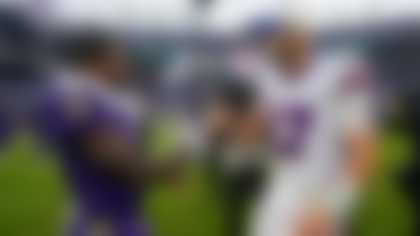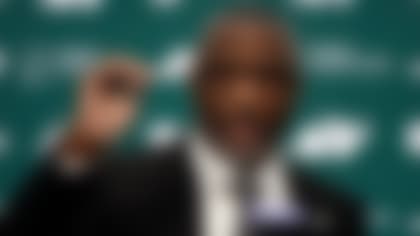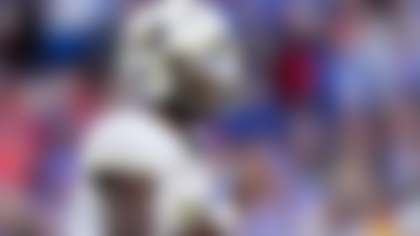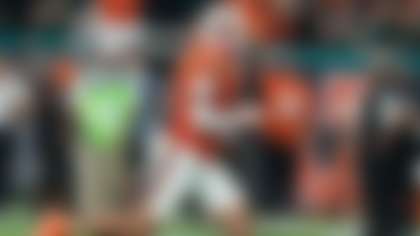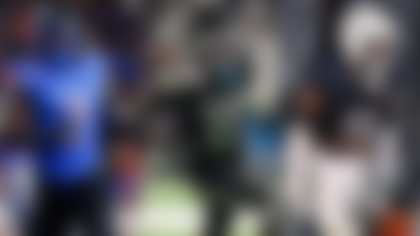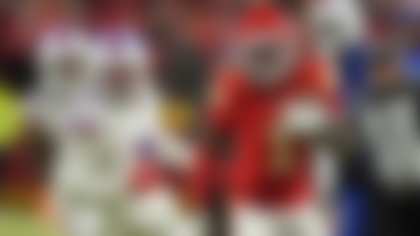Earlier this season, Bill Belichick became the third-winningest coach in NFL history, trailing only Don Shula and George Halas. Given all the New England Patriots have accomplished with The Hoodie at the helm, it's easy to ask: Is there anyone who can beat Belichick?
Well, actually, we don't have to look too hard to find the man who has been Belichick's Kryptonite.
Hello again, Tom Coughlin.
Coughlin went 3-2 against Belichick in the regular season as head coach of the Jacksonville Jaguars and New York Giants, with the two losses coming by a combined four points. But of course, Coughlin truly became a thorn in Belichick's side during their two postseason encounters: Super Bowls XLII and XLVI, each of which ended with Coughlin's Giants hoisting the Lombardi Trophy. That 0-2 playoff record is Belichick's worst mark against any opposing head coach.
Yes, Coughlin will be at this Sunday's AFC Championship Game, representing the Jaguars. But no, he is not the head coach, nor will he be on the sideline. Nonetheless, Coughlin's mark is branded on every coach and player he's been around in his first season as Jacksonville's executive vice president of football operations. These Jags have showcased Coughlin-esque tendencies since the day he arrived.
Why has Coughlin been so successful against Belichick? That's a great question for two of his former players: center Shaun O'Hara and quarterback David Carr. O'Hara played seven seasons for Coughlin's Giants and was part of the Super Bowl XLII team, while Carr served under the coach in New York during two separate stints and was a member of the Super Bowl XLVI squad.
The two former Giants explain what makes Coughlin successful against Belichick in the lead-up to Sunday's game, which just so happens to have a trip to Super Bowl LII on the line:
1) Old-school coaching mindset
Carr: Whether Coughlin's a head coach or the executive vice president of football operations, he has his hand in everything. Most coaches or executives just expect their players to professionally do their jobs. Yet, during his coaching days, Coughlin -- who always let his coordinators and assistants game plan and coach up players, regardless of their coaching title -- often times went around to talk with individual players, showing them weaknesses in their game and demanding the most out of them. He, like Belichick, doesn't care if you're an Eli Manning or a Tom Brady.
From what I've seen, a lot of coaches aren't willing to do a lot of things Coughlin and Belichick carry out at the NFL level. Many are afraid of coaching players hard. I know Belichick isn't afraid to push the best quarterback in NFL history, and that's exactly how Coughlin is. They're equal in that sense. But a lack of this kind of tenacious leadership from the top is what eliminates 80 percent of teams from being able to compete consistently with Belichick's Patriots. I know Coughlin coaches harder and demands more out of players than at least three-fourths of coaches in the league. That's why Coughlin's teams have enjoyed success vs. Belichick.
2) Simple philosophy
Carr: In New York, and from what I see in Jacksonville this season, Coughlin's teams run very simple schemes on offense and defense. When Steve Spagnuolo was the Giants' defensive coordinator in 2007 and '08, he'd always want to do these elaborate defenses, and Coughlin immediately shut those down. It sounds crazy, but Coughlin wanted the opposing offense to know the scheme -- even Tom Brady. Coughlin was confident that his players could win with physicality and discipline, no matter who was on the other side -- and it often worked. There are a ton of coaches who try to outsmart Belichick and Brady, but Coughlin's not one of them. The Coughlin-led Giants didn't do that, and I don't see the Jaguars trying to do that this weekend, either. The goal is to beat them with physicality.
O'Hara: Coughlin's general mindset is more about the physicality of the game than the X's and O's. There are a lot of similarities in personnel between this year's Jaguars and the 2007 Giants, who reaped the benefits of Justin Tuck, Michael Strahan and Osi Umenyiora, among others. The success of the 2017 Jaguars stems from the defense, with a ferocious front that features a bevy of beasts, including Defensive Player of the Year candidate Calais Campbell, Yannick Ngakoue, Malik Jackson, Marcell Dareus and Dante Fowler. The physical play of Coughlin-led teams is the reason he's been such a consistent coach.
3) Preparation and attention to detail
Carr: Although we'd run simple schemes, Coughlin was great at adding subtle differences in the alignment of a defensive end, or playing outside leverage instead of inside leverage. Coughlin came into our quarterbacks room during the first week of prep leading up to Super Bowl XLVI and said, "We've run that in-route so much off play-action that I think we should return the receiver back to the sideline." Sure enough, on a crucial drive in that game, Manning play-action faked and New England's cornerback had run the in-route before our receiver, Hakeem Nicks, did. Then, Nicks stopped and came back toward the sideline to make a huge play. It's the small things that give Coughlin an edge.
O'Hara: When I think back on my seven years playing for Coughlin, it all comes down to attention to detail and preparation. It was stressed constantly that although you can't win the game on Wednesday, Thursday or Friday, you can certainly lose it. That was driven home from the time I got there in 2004 until I retired. To be prepared for any situation gave us great confidence heading into any contest, let alone Super Bowl XLII against Belichick and the Patriots. I specifically remember one instance of this in the weeks leading up to Super Bowl XLII. Our offensive line coach, Pat Flaherty, watched every Belichick-led PatriotsSuper Bowl (XXXVI, XXXVIII, XXXIX) and noticed they started each game with a different front than their normal base 3-4 defense. We talked about that almost every day leading up to the game. It was, Don't be surprised if their defense plays mind games on that first possession. Well, that's what happened. They lined up on the first drive in a 4-3 odd front, but we were ready for it and had a big play from Eli Manning to Plaxico Burress. With the kind of preparation Coughlin demanded from all of us, players and coaches alike, we were ready for it.
In addition, a huge emphasis from Coughlin was to not beat ourselves -- to not allow a bad play to take us out of the game. So many of New England's victories have come from opponents blowing it, making game-changing mistakes. In Super Bowl XLII, Manning largely just stayed away from the Patriots' dominant cornerback, Asante Samuel. It was a mindset of, We're not going to throw in his direction, so don't even look over there. It was the smart decision-making of not allowing us to lose the game on a possible poor play. In fact, many folks probably remember one of the only times Eli did throw in No. 22's direction. It came on the game-winning drive, and Samuel had a chance at a leaping interception on the sideline. Fortunately, he dropped it. The very next play, David Tyree caught a ball with his helmet, and the rest is history.
Follow David Carr on Twitter @DCarr8.
Follow Shaun O'Hara on Twitter @ShaunOHara60.
